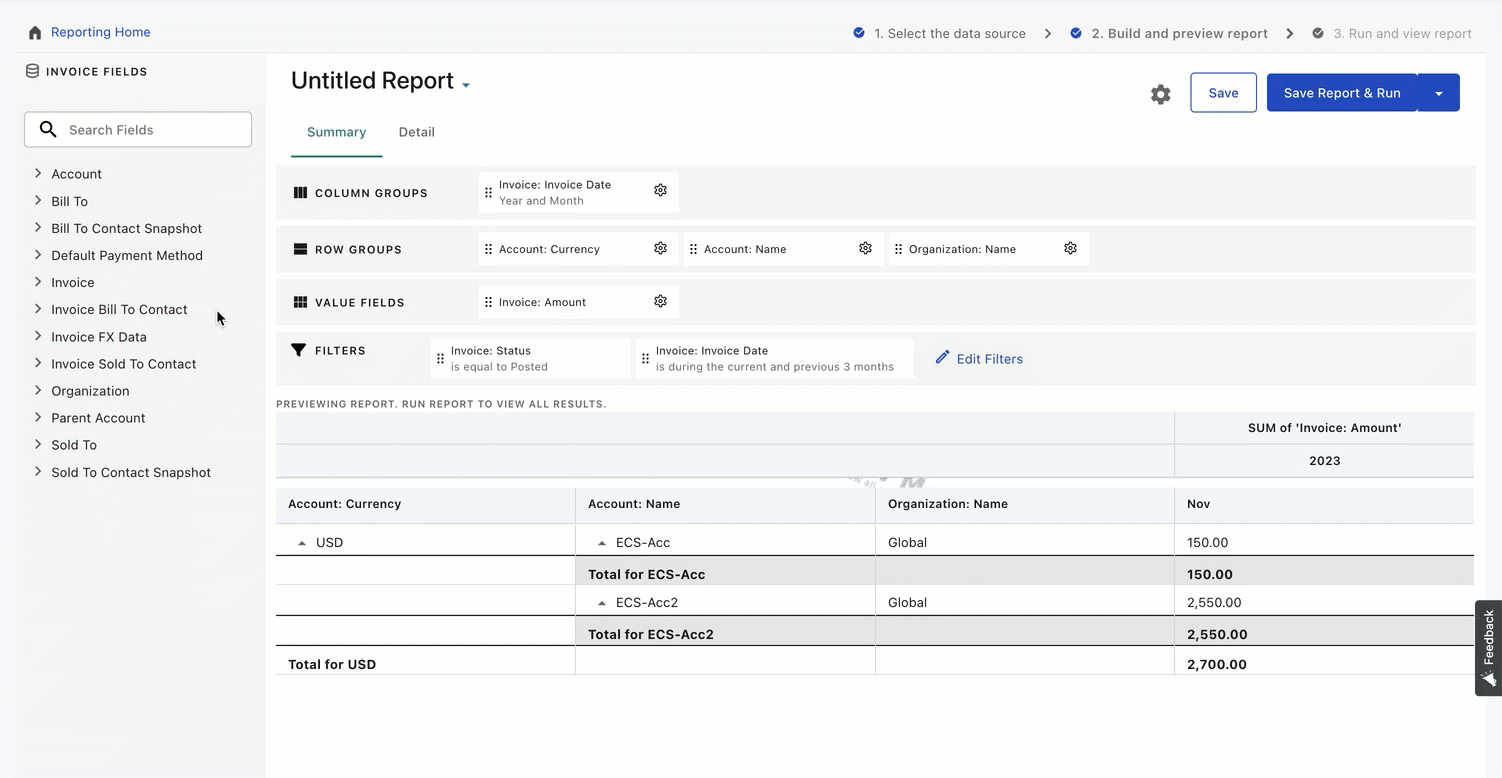Zuora Release 2024.02.R1
Welcome to the release notes for Zuora Release 2024.02.R1. This article is a consolidated page of release notes for the following Zuora products:
For the latest release notes of Zuora Revenue, see Zuora Revenue release notes.
Release schedule
To receive notifications about releases, join Release Notifications in Zuora Community. For the planned release schedule, see Zuora Release Management.
Zuora Billing
 Billing Settings
Billing Settings
User-defined countries and regions available in Contact Snapshot objects
When specifying filters on the Country field from the following objects in Data Sources or Reporting, you can now select user-defined countries or regions from the dropdown list.
- Bill To Contact Snapshot
- Sold To Contact Snapshot
For more information, see Manage countries and regions.
 Orders and Subscriptions
Orders and Subscriptions
Scheduled orders generally available
The Scheduled Orders feature, initially released as an EA feature in 2023.11.R1, is now generally available. For a subscription, you can schedule one or more orders to be executed on future dates through this feature.
 Usage and Rating
Usage and Rating
Mediation feature now available
The Mediation feature is now available to Advanced Consumption Billing customers. This feature is designed to simplify loading of service consumption events into Zuora. Mediation helps translate subscriber consumption data into Usage Records that Zuora can rate and bill for. Mediation drives consumption-based billing adoption by making the ingestion of consumption data effortless, reliable, and cost-effective.
A new menu item, called Mediation, is available in the left navigation panel of the Zuora UI.
The Mediation feature supports the following key functions:
- Create meters
- Create event definitions
- Ingest events
- View audit trails
- Add and configure meter components
Mediation is available only if you have the Advanced Consumption Billing feature enabled. Contact your Zuora Customer Success Manager for assistance if you are interested in accessing this feature.
For more information, see Mediation.
Minimum Commitment generally available
Minimum Commitment allows you to offer subscription services in which your customers commit to spending a minimum amount.
- If the customers don't spend the committed amount by the end of the commitment period, they will be charged a true-up to meet the contracted minimum amount.
- If the customers spend more than the committed amount, they will be charged for the overage.
You can set the minimum commitment fee to a competitive level to acquire more subscribers. This model also ensures a minimum revenue from each subscription.
For more information, see Minimum Commitment.
 Invoicing and Tax
Invoicing and Tax
Billing Schedule feature supports percentage discount charges
With the Billing Schedule feature, you can now manage invoice schedules on orders containing one-time or recurring charges with the Discount - Percentage charge model.
The discount support applies to both rate plan and subscription levels, while account-level discounts are not supported.
Flexible Billing Attributes feature supports invoice grouping for subscriptions
With the Flexible Billing Attributes feature, you can customize invoice groups to bill subscriptions and order line items based on specific criteria.
To achieve this goal, we have introduced a field called invoiceGroupNumber to the Subscription and Order Line Item objects. For the same account, Zuora can bill subscriptions and order line items separately by using distinct invoice group numbers.
Currently, this function is accessible only through the REST API.
For more information, see Invoice Grouping.
Enhancements to e-invoicing service provider configurations
With the E-Invoicing feature, you can now configure an e-invoicing service provider with a company identifier through the Zuora UI and API.
To achieve this goal, we have introduced a field called companyIdentifier for the Sovos service provider configurations. This identifier is used to create a sender system ID, which identifies the system that billing document transactions are sent from. The sender system ID requires approval from Sovos before it becomes effective. Without a valid sender system ID, submissions to Sovos fail.
UI support for configuring Digital Signature function
With the E-Invoicing feature, you can now configure the Digital Signature function through the Zuora UI.
When configuring an e-invoicing business region on the E-Invoice Settings page, you can flexibly enable or disable the Digital Signature function in the Digital Signature section. It is best practice to enable this function by default for India and disable it for other countries where the PDF digital signature is not needed.
You can also customize the signature box position for the printable PDF file through both the Zuora UI and API.
Support for retrieving PDF generation statuses in batch using REST API
You can now use REST API to retrieve the generation status of PDF documents, including invoices, credit memos, and debit memos. The status retrieval operations support querying the generation statuses of multiple documents in one go.
With this enhancement, you can keep better track of the PDF generation process and any other subsequent business flows that depend on the PDF generation.
 Order to Revenue
Order to Revenue
Order to Revenue feature is available to existing Zuora Billing customers
The Order to Revenue feature is now available to existing Zuora Billing customers. If you are an existing Billing customer, you can now use the Order to Revenue feature to enable a complete quote-to-revenue operations process, from quotes to orders, billing, payments, collections, and revenue recognition. This feature enables a single source of truth across Zuora applications.
Previously, only new Zuora customers could access this feature. Compared to the previous version, the Order to Revenue feature now additionally supports the following Zuora Billing features:
- Order Harmonization
- Evergreen subscriptions
- Pending subscriptions
- Order line items with references to the subscription number or term number
- Order line items with the invoice owner
- Custom field direct updates on a rate plan charge
- Multi-org
- Multi-entity
- Multi-currency
After enabling the Order to Revenue feature on your existing Billing tenant, you need to configure the revenue settings, perform data backfill, and then perform data migration. For more information, see Rapid implementation guide.
The Order to Revenue feature is now generally available.
Previously, only new Zuora customers and existing Zuora Billing customers had access to this feature. Zuora Billing-Revenue Integration customers can now migrate to the Order to Revenue feature.
The Order to Revenue feature is the new solution that enables a single source of truth across Zuora applications. The previous solution, Zuora Billing - Revenue Integration, is no longer available to new Zuora customers as of October 1, 2023.
Zuora Payments
 Payments
Payments
Enhancement to passing Industry Type information to Chase
We have enhanced the logic of populating the Industry Type field in the request to Chase. For authorization and payment transactions using Credit Card or Google Pay payment methods through Chase Paymentech Orbital Gateway integrations, the Industry Type field is now populated by using the following prioritized sources:
- Gateway Options: The
Industry Typevalue in thegatewayOptionsfield takes precedence. - Gateway configuration setting: If no value is available in the
gatewayOptionsfield, theIndustry Typevalue specified on the gateway instance configuration page is used. - The
RCvalue: If neither of the preceding sources provides theIndustry Typevalue,RCis used.
Previously, regardless of the values specified through gateway options or the gateway configuration page, RC was always sent for Industry Type.
Payment Link feature available for early adopters
Zuora now offers the Payment Link feature that allows you to share payment links with your customers to collect payments. You can define a default payment link template for your tenant without any code. Zuora uses this template to generate hosted payment pages and payment links for invoices that are posted after the Payment Link feature is enabled on your tenant. You can share the payment link of an invoice across multiple channels such as invoice documents, emails, and text messages.
This feature is in the Early Adopter phase. We are actively soliciting feedback from a small set of early adopters. If you want to join this program, submit a request at Zuora Global Support.
For more information, see Payment Link.
Update on CyberSource Payment Method Updater
To follow the changes to Cybersource's authentication standards, a new CyberSource Transaction Security Key Password field is now available on the configuration page for CyberSource Payment Method Updater. You can enter your password set by yourself during the generation of the Transaction Security Key to secure the P12 key.
For more information, see Configure CyberSource Payment Method Updater.
Enhancement to prevent creation of duplicate payment methods
We have extended our duplication check feature to more types of payment methods created or updated through various approaches. Previously, we supported the duplication check only for Credit Card payment methods created through REST API operations. Now, we have added the following types of payment methods to this support. When creating or updating these payment methods through the following approaches, if fields required for duplication check are passed in, Zuora will check the active and closed payment methods associated with the same billing account to ensure that no duplicate payment methods are created.
| Payment method type | Creating or updating approach |
|---|---|
| Credit Card |
|
| ACH | |
Bank Transfer:
|
To enable this enhancement, submit a request at Zuora Global Support.
For more information, see Duplication check on payment methods.
Enhancement to Zuora Fraud Protection
We have improved Zuora Fraud Protection on screening transactions when creating payment methods. Previously, if you planned to screen transactions initiated from hosted payment pages with the fraud protection service, enablement of the Verify New Payment Method setting for the gateway instance was required. This requirement has now been removed. Transactions from hosted payment pages, as well as any operations that create a payment through the Zuora UI, APIs, or payment runs are screened regardless of whether the Verify New Payment Method setting is enabled, as long as the corresponding Zuora Fraud Protection options are enabled on the setting page.
For more information about Zuora Fraud Protection settings, see Enable and configure Zuora Fraud Protection.
Enhancements to CyberSource v2.0
We have made the following enhancements to CyberSource v2.0 payment gateway integrations:
- We have enhanced the logic of populating the payment method address fields in the request to CyberSource. The address fields will be filled based on the following priority order:
- Address of the payment method: The address of the payment method takes precedence.
- Bill-To address: If no information is available in the payment method address, the Bill-To address is used.
- Sold-To address: If neither the payment method address nor the Bill-To address is available, the Sold-To address is used.
- Debit Card payment methods are now supported through the Zuora UI and SOAP API operations.
Real-Time Reconciliation available for payment and refund events on Adyen v2.0
Adyen Integration v2.0 in Zuora now supports the Real-Time Reconciliation feature for payment and refund event types on all the supported payment methods. Adyen will submit notifications to Zuora for the payment and refund events, and the corresponding records in Zuora will be automatically updated in real time.
For more information, see the following articles:
Enhancement to use of OAuth tokens in Stripe Real-Time Reconciliation
We have improved the self-enablement of Real-Time Reconciliation for Stripe by enforcing consistent OAuth token usage.
- If you enable Real-Time Reconciliation in a sandbox environment, only tokens for the test environment are loaded in the list and can be used for enabling Real-Time Reconciliation.
- For the enablement in a production environment, only tokens for the production environment are loaded for use.
For more information about how to generate tokens for different environments, see Enable and configure Real-Time Reconciliation for Stripe.
Enhancement to payment rejection and reversal in Gateway Reconciliation
We have improved the Gateway Reconciliation service to support creating external refunds in the following events or API operations, regardless of whether the respective reason codes are active or not.
| Event and API Operation | Handling Logic |
|---|---|
|
|
|
|
Zuora Central Platform
 Events and Notifications
Events and Notifications
Resending email notifications with the latest sender and recipient information
When resending email notifications, we now use the following information from the email template associated with the email notification:
- From Name
- From Email
- To Email
- Reply-to Email
- CC Email
- BCC Email
Previously, information from the email history snapshot was used.
New email template editor
The new email template editor is now available in the Zuora UI. This component-based editor gives you a better user experience in creating or editing email templates, including but not limited to the following features:
- Drag and drop
- More content types (Columns, Button, Menu, and more)
- More style options
- Multi-screen email preview
- Backward compatibility
In addition, you can now use functions and advanced merge field syntax supported by HTML templates for billing documents in email templates. For more information, see the following articles:
Support for using custom fields of custom objects as merge fields
When configuring email templates or callout notifications for events based on a Zuora standard object (such as Account, Invoice, or Subscription), if you have custom objects with relationship-type fields linking to this standard object, you can now use custom fields of these custom objects as merge fields.
For example, suppose that you have a custom object Vehicle that contains the following entitlement-type custom fields VIN__c, Make__c, Model__c, and AccountID__c where the AccountID__c is a relationship-type field linking to the Account object. When creating a notification for the Order Processed event, you can use the VIN__c, Make__c, and Model__c fields as merge fields.
You can use variables, expressions, and other merge field syntax by following the Mustache Specification to customize the custom object records displayed within your notification. For example, you can filter and include the last created custom object record in your notification.
For more information, see the following articles:
Notification definition API operations support notifications for standard events
The notification definition API operations now support creating, retrieving, modifying, and deleting notifications for standard events, custom events, or custom scheduled events.
See each API operation for more information:
- Create a notification definition
- List notification definitions
- Retrieve a notification definition
- Update a notification definition
- Delete a notification definition
Previously, these API operations applied only to notifications for custom events or custom scheduled events
Support for displaying related email templates for email notification histories in Zuora UI
A new column called "Email Template" is now available in the Email History tab on the "Setup Profiles, Notifications and Email Templates" page in Zuora UI.
You can view and edit the related email template of any email notification history by clicking the link in the Email Template column.
 Reporting
Reporting
UI support for disabling sorting in reports
You can now disable the sorting of fields in COLUMN GROUPS and ROW GROUPS within Standard and Detail reports through the Zuora UI.
Disabling sorting will result in faster report runs for larger tenants and complex reports.
From the summary report page:
- To disable sorting for a field, click the gear icon next to the field
- In the Sort By option, select None.

Support for translation in report headers on scheduled report runs
Zuora Reporting now supports the translation of headers for scheduled reports. The header of the scheduled report will be automatically translated to the language you've set in your profile. For more information, see personal settings. Zuora currently supports the following languages for translation:
- English
- Japanese
- French
- German
- Spanish
The translation is only applicable to the report headers.
UI support in reports for navigation to Credit Memo and Debit Memo details page
You can now navigate to the Credit Memo and Debit Memo details page from the UI. For reports based on Credit Memo and Debit Memo data sources, the following fields are available as hyperlinks to navigate to the detailed view page in a new tab.
- ID
- Number
Previously, this capability was only available for reports based on Account, Invoice, and Subscription objects.
.gif?revision=1&size=bestfit&width=660&height=357)
REST API
For the detailed API documentation, see API Reference.
For a summary of REST API updates and documentation updates in the Zuora API Reference, see 2023 API Changelog.
Quickstart API
From 2022.09.R1, the Quickstart API is available to you if you have the Orders (or Order Harmonization) and Invoice Settlement features enabled in your tenant. The QuickstartAPI allows new integrators to swiftly integrate with Zuora, and it supports essential business use cases.
For the detailed Quickstart API documentation, see Quickstart API Reference.
For a summary of REST API updates and documentation updates in the Quickstart API Reference, see Quickstart API Changelog.
SOAP API
Current WSDL version: 141
For information about how to check your version and download the latest version. see Zuora WSDL.
SOAP API change history
For a summary of updates made to the SOAP API in recent Zuora releases, see Zuora SOAP API Version History.

